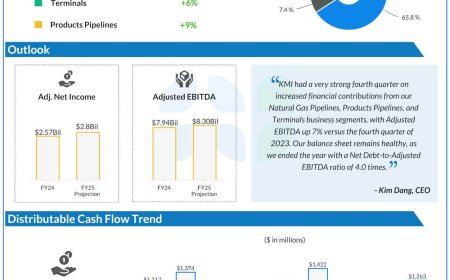How Great Leaders Create a Culture of Accountability
Accountability is the most important factor in successful organizations. It relates to the personal responsibility of employees to their action and decisions and is a powerful tool for achieving a productive working environment. A good leader realizes the importance of accountability and continuously fosters a culture where each individual feels individually responsible for the contributions […] The post How Great Leaders Create a Culture of Accountability appeared first on Insights Success.

Accountability is the most important factor in successful organizations. It relates to the personal responsibility of employees to their action and decisions and is a powerful tool for achieving a productive working environment. A good leader realizes the importance of accountability and continuously fosters a culture where each individual feels individually responsible for the contributions they are making.
The article discusses what effective leaders do to foster a sense of accountability among their employees.
Setting Clear Expectations
A foundation of accountability is to clearly set expectations. Leaders need to communicate their vision, objectives, and standards so that every employee can easily grasp them. The accountability of each becomes easier to ascertain when the employee knows what’s expected of them. A clear setting could be through regularly scheduled meetings and detailed documentation plus open communication through which questions could be asked as well as through which feedback will be welcomed.
Besides clarity, leaders should ensure that goals are measurable and achievable. Specific targets set by the leader allow team members to understand how their contributions fit into the larger picture. When employees see the direct impact of their work on organizational success, they are more likely to take ownership of their responsibilities.
Promoting Open Communication
Communication with a free flow helps to create a culture of accountability. Leaders that encourage honest talk create an environment in which team members feel safe and are able to express their thoughts and concerns. Open communication with ideas strengthens the relationships and will help identify the potential issues before they escalate.
Communication can be improved through regular check-ins and feedback sessions. The interactions should be constructive, addressing both successes and areas for improvement. Through continuous feedback, leaders help employees know their strengths and identify areas of growth. This makes accountability a two-way street; leaders and team members share the responsibility and work towards improvement.
Leading by Example
Leaders are role models for the teams. The best example they can set is when they hold themselves accountable in their actions. This means that they take responsibility for their mistakes, admit when things do not go as planned, and take corrective actions. This is how transparency about their challenges and failures leads to a culture where team members feel empowered to do the same.
Additionally, leaders must lead by example. If the leader demands his team to be punctual and meet deadlines while maintaining high standards, then the leader should meet the same standards. This makes the message that accountability is an organizational value become more believable because of consistency and respect. Empowerment Encouragement
Accountability requires empowerment. The best leaders understand that to give their teams the power to make decisions promotes ownership and accountability. When an employee feels empowered, he or she is more apt to take charge and be responsible for his or her role in the organization.
The act of empowering further involves the responsibility delegation and sharing of decision-making processes with members in the team. This will promote engagement, and it also inspires creativity and innovation. The person who has control over how they do their job is more likely to be answerable for what happens.
Avail Support and Resources
It does not necessarily mean leaving members of the team to fend for themselves in any given situation. The great leaders have to provide necessary support and resources to help them succeed. That means training, mentorship, and access to tools that make work easier. With a feeling of being supported, employees are likely to take more risks and keep themselves accountable.
Thirdly, leaders should note and praise milestones. Rewards make the person have high morale; it is in a way persuading people to do even more for their respective excellence. Leadership acknowledgment of individual effort and accomplishments serves as reminding of responsibility that can drive workers towards that action.
Creating Accountability Through System of Punishments and Incentives
A well-defined system of consequences and rewards is a must in the reinforcement of accountability within an organization. Leaders have to ensure that there are repercussions for failing to meet expectations while recognizing and rewarding those who exceed them. This balance helps create a fair environment where individuals understand that their actions have consequences.
Also, through praise for accomplishments by leaders, teams become proud of themselves and gain the urge to achieve. It is rewarding people with recognition; they may recognize with verbal acknowledgments, incentives with monetary compensations, and promotion in one’s career, and it would develop an atmosphere of accountability value.
Cultivation of a Growth Mindset
A growth mindset is the opinion that abilities and intelligence can actually be developed based on effort as well as diligence. Leaders have the power of creating an atmosphere where mistakes are lessons learned rather than failures. Through such a culture, team members are more than likely to act responsibly because such a culture affirms that “growth and success are part and parcel of every journey.”
Continuous learning and development encourage the growth mindset among leaders. It is an organization that creates avenues for growth by offering its people workshops, training sessions, or even peer coaching that enhances the skill and provides a sense of responsibility. Improving rather than perfection fosters teamwork with risk and the ability to learn from it.
Conclusion
To achieve success in any organization, creating accountability in the organization’s culture is paramount. Great leaders play a critical role in setting up and maintaining this environment. Clear expectations, open communication, leading by example, empowering employees, support, rewards and consequences, and a growth mindset all contribute to a workplace where accountability thrives. It not only helps individuals perform better but also contributes to collective success, ultimately driving the organization toward its goals. In such an environment, team members feel valued, empowered, and responsible, thus laying the groundwork for sustained growth and achievement.
The post How Great Leaders Create a Culture of Accountability appeared first on Insights Success.











































